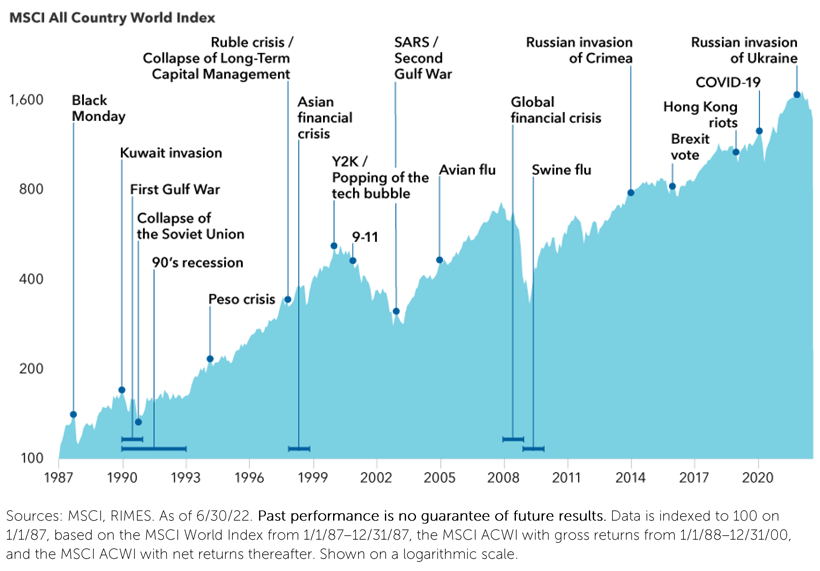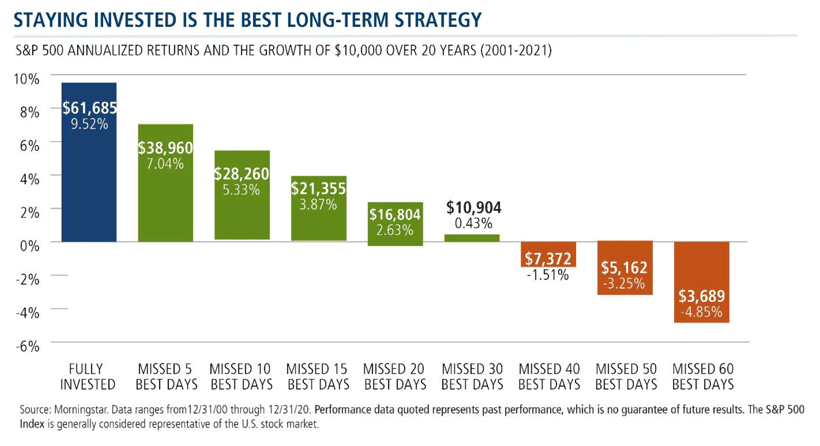Strategies to Survive a Volatile Market
Calamos Wealth Management has proactively guided clients through a variety of markets and economic cycles. We recognize that wealth is personal, and everyone responds to the stresses of a bear market differently. As the chart below illustrates, market volatility is created by a variety of reasons; from geopolitical-to-economic-to-valuations. Each time, markets have rallied back.

We created the following best practices that our team has used to communicate and maintain a collegial approach to ensure our client’s financial well-being is preserved.
Keep Perspective…This too Shall Pass
Corrections and bear markets are part of being an investor. The good news is bull markets are longer in duration and stronger in returns than bear markets. Based on historical returns of the S&P 500, the equity markets are positive approximately two-thirds of the time. This makes investing favorable for investors over full market cycles.
Review Your Risk Tolerance and Asset Allocation
Warren Buffett has famously said “when the tide goes out, you can see who is swimming naked”, implying that when markets are rising, one’s risk tolerance level may be higher than thought. Market downturns present a good opportunity to evaluate these concerns with your advisor. However, we do not recommend making dramatic changes to asset allocation strategies during market downturns but instead, being prepared to proactively make changes when appropriate.
Create a Financial Plan
Our team of wealth advisors and strategists will help to create a customized financial plan with cash flow projections. These projections can help you better understand what it takes to maintain your standard of living on an inflation adjusted basis. Each cash flow projection is stress tested to understand the impact of volatile markets, providing our clients financial peace of mind during any market environment.
Tax Loss Harvest (TLH)
Tax Loss Harvest is the process of selling securities in taxable accounts that have a loss, waiting 31 days and buying the security back. We recognize that selling investments that have gone down in value may feel unnatural, however, it is a sound financial and tax strategy. The losses can be used to offset realized gains or be carried into the future, improving your after-tax returns for years to come. Additionally, the IRS allows you to use $3,000 of losses annually as an offset against regular income.
The portfolios we create, implement, and manage are well diversified investment strategies, utilizing a core, strategic and tactical approach towards asset allocation. We do not recommend making major asset allocation changes during times of market stress. At times, this may look like a “hurry up and do-nothing approach”, however, we actively manage client portfolios, security selection and asset allocation to take advantage of opportunities throughout all market cycles.
According to Morningstar, investors who stayed invested during the past 20 years maximized their returns. Missing the best days, which typically take place close to the worst days have a material impact on overall returns. Time in the market is more important than trying to time the market.

As investors we have faced and survived volatile markets over many decades. It’s important to stay focused on your plan and not get sidetracked by the headlines and short-term market movements. In our experience, the seed of future out performance is sown during down markets. Should you be concerned about the impact to your portfolio, we encourage you to reach out to your Advisor or any member of your Calamos Wealth Management team to further discuss your personal situation.
Disclosure
Past performance may not be indicative of future results. Different types of investments involve varying degrees of risk, and there can be no assurance that the future performance of any specific investment, investment strategy, or product (including the investments and/or investment strategies recommended or undertaken by Calamos Wealth Management, LLC [“Calamos]), or any non-investment related content, made reference to directly or indirectly in this commentary will be profitable, equal any corresponding indicated historical performance level(s), be suitable for your portfolio or individual situation, or prove successful. Due to various factors, including changing market conditions and/or applicable laws, the content may no longer be reflective of current opinions or positions. Moreover, you should not assume that any discussion or information contained in this commentary serves as the receipt of, or as a substitute for, personalized investment advice from Calamos. Please remember to contact Calamos, in writing, if there are any changes in your personal/financial situation or investment objectives for the purpose of reviewing/evaluating/revising our previous recommendations and/or services, or if you would like to impose, add, or to modify any reasonable restrictions to our investment advisory services. Unless, and until, you notify us, in writing, to the contrary, we shall continue to provide services as we do currently. Calamos is neither a law firm, nor a certified public accounting firm, and no portion of the commentary content should be construed as legal or accounting advice. A copy of the Calamos’ current written disclosure Brochure discussing our advisory services and fees continues to remain available upon request or at wm.calamos.com. Please Note: If you are a Calamos client, please advise us if you have not been receiving account statements (at least quarterly) from the account custodian.
Calamos Wealth Management 2020 Calamos Court | Naperville, IL 60563 | 888.857.7604 | www.calamos.com/wm | cwm@calamos.com
©2022 Calamos Investments LLC. All Rights Reserved. Calamos® and Calamos Investments® are registered trademarks of Calamos Investments LLC.
CWM 6895 0922